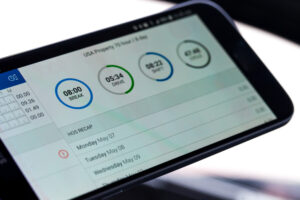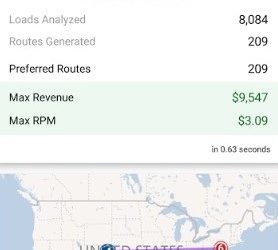While most of you already know about the Electronic Logging Devices (ELD) Mandate, here is a brief background and a more in-depth look.

In 2012, Congress enacted the MAP-21 bill, including a mandate for the use of ELDs. ELDs were made to streamline and monitor the Hours of Service (HOS) or paper log books. Paper log books are currently being used as the standard method of bookkeeping for commercial motor vehicles.
The ELDs are intended to help professional drivers log their HOS for both their employer and DOT inspectors. ELDs are supposed to reduce accidents related to driver fatigue.
ELD vs AOBRD
ELD’s predecessor, the Automatic On-Board Recording Device (AOBRD) is like the more modern ELDs. However, there is just one key difference. The AOBRDs were the old standard in electronic logging, and the ELDs comply with the MAP-21 regulations.
Similarity between ELD and AOBRD
- Both devices would record a driver’s status, change in status, and total time they operated the vehicle.
- Both devices were linked to the truck’s engine to calculate and record run time in between inactive periods.
- Both displayed a Record of Duty (ROD) showing the hours a driver had been active in that driving segment.
- Both create electronic files in real-time that can be viewed by the drivers, fleet managers, or DOT personnel.
This is where the similarities stop.
Differences between ELD and AOBRD
- The new ELDs will provide GPS solutions for drivers with more road, traffic, and weather conditions.
- ELDs will record more data for fleet managers, including driving indicators like hard breaking or speeding.
- ELDs will reduce paperwork for drivers, fleet managers, and DOT personnel by making all records searchable and recorded automatically.
- Eventually, ELD software will be expanded to include emergency sensors, which will alert emergency services and fleet managers when a truck experiences conditions outside normal parameters and possibly add features monitoring the driver’s health and awareness inside the cab.
ELDs: It’s not all bad
While there is still much debate around the new mandate, there may be some benefits to drivers and fleet managers. The new system is being turned to electronic, and the mandate is being enforced in all fleets by the year 2017 or 2019 to retrofit outdated systems.
Drivers may be happy to hear that a recent study by the FMCSA found the average ELD cost was between $160 – $900 per truck unit, with the average and most popular ELD model costing $495 per truck. Smartphone and handheld options are available and can be MAP-21 compliant with the right software uploads.
This cost, though steep to some larger fleets, can become more digestible when you look at the paperwork reduction involved by going electronic. According to the FMCSA study, economic benefits from the conversion to MAP-21-approved ELDs will far undercut costs associated with outdated paper recording methods. In short, the FMCSA expects the ELDs to pay for themselves in time with the paperwork reduction.
Many drivers and fleet managers have mixed feelings about ELDs regarding their cost, driver’s privacy, and their importance in the trucking industry, as it seems “Big Brother” is always watching over our shoulders. While these concerns are valid, some can be eased by having the most accurate information about ELDs and the MAP-21 mandate, as its compliance date seems right around the corner.
Click here to read more about ELD and MAP-21.



 In the trucking industry, we begin to reflect on the different changes that occurred in 2018. The electronic logging device (EL...
In the trucking industry, we begin to reflect on the different changes that occurred in 2018. The electronic logging device (EL...

